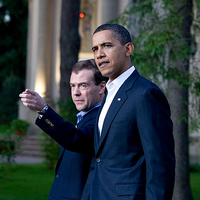Having reached an agreement on the New START treaty in April, the Obama administration's next step in its pursuit of a new strategic partnership with Russia appears to be establishing some type of joint collaboration on ballistic missile defense (BMD). These recent efforts should be applauded, as they hold the potential to reinforce trust and cooperation between the two powers, as well as to solidify a united defense against the growing threats from Iran and North Korea. Such an accord would also appear to be integral to the prospects of achieving further nuclear arms reductions agreements and working gradually toward a world without nuclear weapons. Reaching an agreement is unlikely to be easy, but the potential diplomatic, strategic and political rewards warrant the Obama administration making BMD cooperation a top foreign policy priority.
Despite the fact that the idea of U.S.-Russian BMD cooperation is several decades old, very little tangible progress has been achieved since the Global Protection System envisaged by President George H.W. Bush and his Russian counterpart, Boris Yeltsin, in 1992. While this was certainly due in part to the subsequent strategic priorities of Presidents Bill Clinton and George W. Bush, it was also a reflection of the nascent technological status of many BMD systems under development. Under President Barack Obama, and according to the recent Ballistic Missile Defense Review and Nuclear Posture Review, BMD has assumed an established role in U.S. security strategy. With the expansion of U.S. BMD activity around the globe, but particularly in Europe, and with Obama's focus on cooperation in U.S. foreign policy, the time seems ripe to attempt to negotiate some type of agreement.
It would also seem prudent to begin talks before U.S. and NATO BMD systems expand to such an extent that they become an insurmountable obstacle in U.S.-Russian relations. Any such agreement is likely to be fairly rudimentary at first, perhaps beginning with some type of coordinated but separate deployments against Iran. But a gradual step-by-step process could eventually lead to sharing early warning data and perhaps even some collaboration on command and control. Such a process would significantly enhance U.S. and Russian security, strengthen bilateral relations, and bring more pressure to bear on international pariahs like Iran and North Korea.

